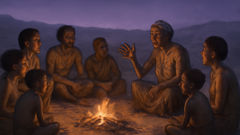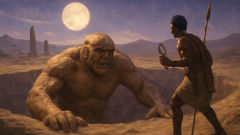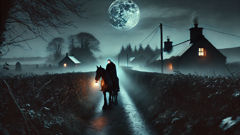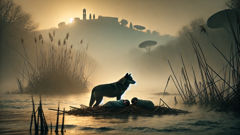Introduction
The sun, heavy and gold, sinks behind the endless dunes of Namibia, painting the desert in copper and indigo. The evening wind whips across the ochre sand, singing a song older than the stones themselves. In this land—where shadows stretch long and the earth seems to hold its breath—stories have always been more than just words. Among the Khoikhoi people, whose ancestors have walked these lands for generations untold, legends live and breathe in every gust of wind and shifting star. And of all their tales, none sends more shivers through the soul than the one whispered around firelight: the legend of Ga-gorib. According to the oldest among them, Ga-gorib is not simply a beast but a riddle—one that slumbers in a pit as deep as night, waiting for the desperate and the brave. Some say he is a spirit born of the desert’s hunger; others believe him to be a punishment sent by forgotten gods. All agree on his method: with stones clutched in his great hands, Ga-gorib lures the curious to his pit’s edge, then hurls rocks with monstrous strength and cunning, claiming those who lose their footing to the darkness below. Villages keep their children close, warning them with tales of lost travelers and echoing cries that never return. But legends do more than frighten; they shape destinies. For every generation, there is someone who refuses to tremble in the dark, who feels the call to challenge the ancient terror and seek the truth behind the myth. This is the story of such a soul—a young man named Khaeb, whose courage would be tested not only by the monster in the pit but by the mysteries of his own heart. As the stars blink to life and the embers glow bright, the legend of Ga-gorib is about to begin anew.
Whispers on the Wind: The Village of Oanob
Nestled between jagged outcrops and wind-sculpted dunes, the village of Oanob lay quiet under a sky peppered with stars. Huts woven from reeds and clay huddled together as if seeking comfort from the vast, indifferent desert. Life in Oanob was a delicate balance—a dance with the elements, where survival meant listening to the land and its warnings.

Khaeb grew up with these warnings echoing in his ears. His grandmother, wise and sharp-eyed, was the village storyteller. She claimed to have seen the footprints of Ga-gorib herself, wide and deep as a man’s fist, impressed in the sand at dawn. Each night, children circled her at the fire’s edge, eyes wide as she described the beast’s pit—how its walls were sheer, rimmed with the bones of antelope and the shiny stones that lured wanderers close. She spoke of the way Ga-gorib waited, silent as the moon, until the wind carried his prey to the edge. Then—like thunder—the rocks would fly.
Despite the fear, Khaeb felt a pull in his chest, something like curiosity but sharper. He remembered when his older brother, Anan, disappeared three dry seasons ago. Anan had been bold, restless, and convinced he could outwit any monster. He never returned from his journey eastward, and his name became a hush on everyone’s lips. Only Khaeb’s grandmother would speak of him, her voice trembling with sadness and pride.
One afternoon, as Khaeb repaired his family’s water gourd, he overheard two elders whispering. They spoke of strange tracks near the old well, stones piled in unnatural patterns, and a lost goat found battered beside a pit. Some said Ga-gorib was restless again, hungry for new stories to fill the night. Others muttered about a curse—an ancient wrong demanding to be righted. The elders decided to hold a gathering. A decision had to be made: either move the village or confront the legend.
That night, the council fire burned bright and anxious. Khaeb listened as voices rose and fell, heavy with worry. The bravest hunters remembered old tricks—how to throw spears at shadows, how to listen for the tremble in the sand. But none volunteered to face the pit itself. Khaeb’s heart hammered. He remembered his brother’s laughter, the way Anan would stand at the edge of reason and dare the world to push him. The urge to step forward burned in Khaeb’s chest like a coal. Was courage something you were born with, or something you chose?
After the meeting, he found his grandmother sitting by the embers. She looked at him, her gaze both fierce and gentle. “The stories choose us, Khaeb,” she whispered. “But we must decide what to do with them.” The words echoed inside him, mingling with grief and longing. That night, as he lay beneath the stars, Khaeb made his decision. He would seek out Ga-gorib—not for glory, not even for revenge, but to understand what truth lay beneath the legend, and perhaps find his brother’s fate. The wind carried his promise into the desert, where it mingled with old secrets and ancient fears.
Desert Shadows: The Journey to the Pit
Khaeb awoke before dawn, the world still hushed and painted in blue shadows. He packed a small satchel with dried meat, a waterskin, and his father’s old spear. His grandmother pressed a smooth stone into his palm—an ancient talisman etched with symbols of protection. “Trust your heart, and trust the land,” she said. Her hands lingered on his shoulders, firm and reassuring.

He set out as the first sliver of sunlight kissed the horizon. The air was crisp, scented with acacia and dust. Khaeb moved quickly through familiar paths, his mind replaying every story he’d ever heard about Ga-gorib: the tricks, the traps, the pit so deep no echo returned. As he walked, larks and korhaans scattered before him, their wings flashing like silver in the morning light.
The desert was both a comfort and a challenge. It hid secrets under every stone. Once, Khaeb stopped to study strange markings in the sand—broad, clawed prints leading eastward, vanishing over a rocky rise. He shivered and pressed on. Hours passed, sun rising higher and hotter, baking the world to silence. The landscape changed: low hills gave way to flat plains, then to a wilderness of boulders and thorn bushes.
Around midday, he found himself atop a stony ridge overlooking a vast, desolate expanse. In its center, like a wound upon the earth, was the infamous pit. It was larger than he’d imagined—its rim surrounded by scattered bones and glinting stones that caught the sunlight like eyes. Khaeb crouched, watching from a distance. For a long time, nothing moved. Even the wind seemed to avoid this place.
Summoning his courage, Khaeb descended the slope. The air felt heavier here, thick with ancient dread. Each step sent small pebbles tumbling into the abyss. He circled the pit carefully, searching for clues. He noticed several odd piles: stones arranged in patterns that didn’t seem natural, as if left by giant hands. Animal remains littered the ground—broken horns, crushed skulls, feathers slick with old blood.
Khaeb examined the stones more closely. Some bore markings similar to his grandmother’s talisman. Were they warnings? Prayers? He traced them gently, feeling a connection to all who had come before him. The silence pressed closer.
Suddenly, from the depths of the pit, there came a soft rumble—like thunder muffled by sand. Khaeb froze, heart pounding. A faint movement caught his eye: a shadow shifting far below. He watched as something enormous stirred in the darkness. The ground trembled. Then, with a sound like stone scraping bone, a massive rock sailed upward, landing dangerously close to Khaeb’s feet. Dust billowed; the message was clear.
But instead of running, Khaeb knelt and called out in the old language of his people. He spoke words of respect and offered a piece of dried meat to the void. For a moment, only silence answered him. Then, the earth shuddered again—gentler this time. Khaeb felt a strange calm wash over him. Perhaps the monster was not simply a beast, but something more: a guardian, a judge, an ancient hunger that could be reasoned with. He rose and sat at the pit’s edge, waiting for night to fall, determined to see what truths would emerge in the moonlight.
Night of Stones: The Meeting with Ga-gorib
As dusk fell, the colors of the desert shifted to bruised purple and gold. The world grew quiet except for the mournful call of a distant jackal. Khaeb remained vigilant at the pit’s edge, gripping his spear and talisman. Shadows crept across the sand, and the air turned cool and tense.

Suddenly, from below, there came a low, guttural growl—a sound that seemed to rise from the earth’s core. Slowly, a figure emerged from the darkness: Ga-gorib, colossal and formidable, yet unmistakably real. His skin was the color of riverbed clay, craggy and streaked with age. His limbs were thick and powerful, ending in hands large enough to cradle a goat. Two small, intelligent eyes gleamed in his massive head. He stared up at Khaeb, assessing, unblinking.
For a moment, neither moved. Then Ga-gorib’s voice echoed up, deep and strange: “Why do you come, child of men? Do you seek your fortune or your doom?”
Khaeb steadied his breath and answered with respect, “I come to know you. I come to learn what truth lies beneath our fears.”
Ga-gorib grunted, amused or perhaps surprised. He shifted, sending small rocks tumbling into the abyss. “Many have come for glory or gold. Few come seeking wisdom.”
The conversation unfolded in riddles and questions. Ga-gorib demanded stories—tales of Khaeb’s people, their joys and sorrows. In return, he shared cryptic fragments of his own origin: how he was once a guardian of sacred springs, twisted by loneliness and anger when humans stopped listening to the old ways. He admitted to hurling rocks not out of hatred, but to test hearts—separating the greedy from the brave.
As the moon rose high, Ga-gorib offered a challenge: “If you can answer my riddle and prove your courage, you may pass unharmed—and carry my tale back to your people.”
Khaeb agreed. The beast’s riddle was ancient and tangled: “What is heavier than a mountain but lighter than a feather? What breaks without touch, yet binds without chains?” Khaeb pondered, recalling his grandmother’s words, his brother’s laughter, and the stories that shaped his life.
Finally, he answered: “It is fear. Heavier than mountains when carried alone, lighter than feathers when shared. It breaks us apart when unspoken but binds us together when faced.”
Ga-gorib roared, not in anger but in triumph. “You have spoken true,” he declared. “You may go. But remember: legends are not meant to frighten, but to teach.” The beast withdrew into darkness, leaving Khaeb alone under the star-strewn sky.
Before leaving, Khaeb called out, “What became of my brother Anan?”
A long silence followed. Then, softly, Ga-gorib replied: “He faced his fear and found peace. Tell your people: the pit holds not only death, but understanding.”
Khaeb wept—tears of relief, sorrow, and gratitude. As dawn broke, he gathered a smooth stone from the pit’s edge—a token of his courage—and began the long journey home.
Conclusion
Khaeb returned to Oanob as the sun crested the dunes, his heart forever changed. He carried with him not just the story of his encounter but a new understanding of courage—one that spoke not of reckless bravery, but of facing fear with honesty and respect. The villagers gathered eagerly as he told them what he had seen and learned, his words weaving hope into old dread. The legend of Ga-gorib transformed that day: from a tale of terror to a story of lessons learned, wounds healed, and the importance of listening to both ancestors and land. Khaeb’s journey became a cherished song among his people—a reminder that sometimes the monsters we fear are simply guardians of wisdom, waiting for someone bold enough to seek their truth. And so, as the desert winds continued their ancient dance and the pit remained a shadow on the horizon, the story of Ga-gorib lived on—forever part of Namibia’s heartbeat, echoing through time.













